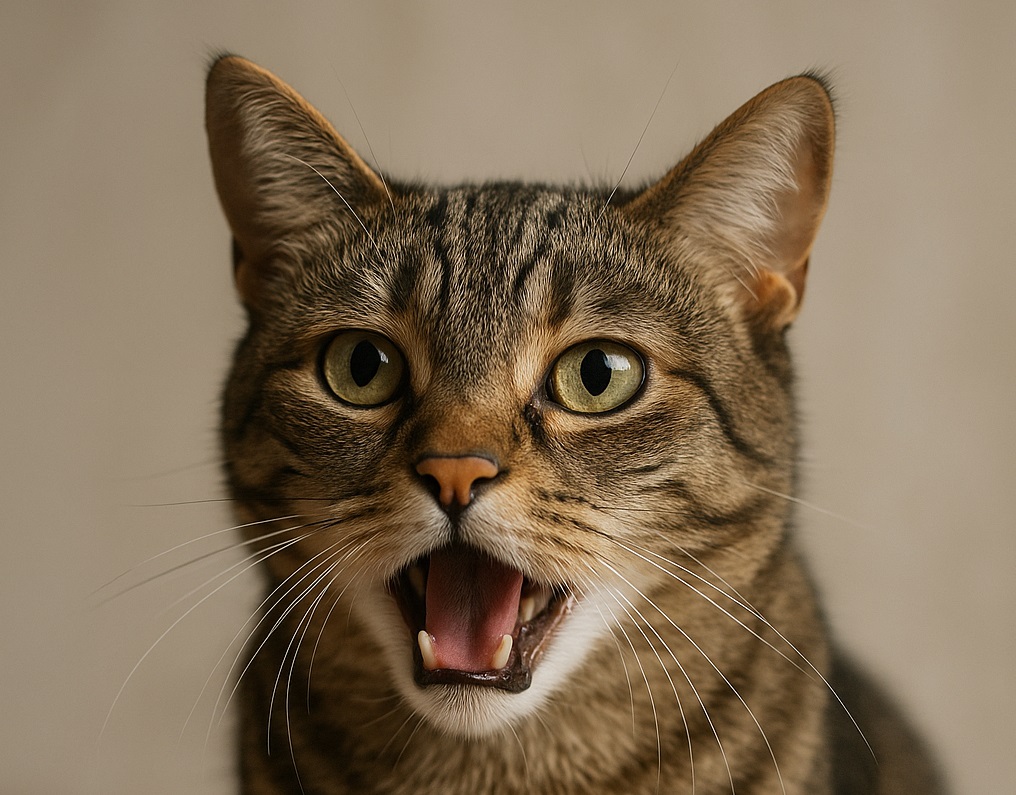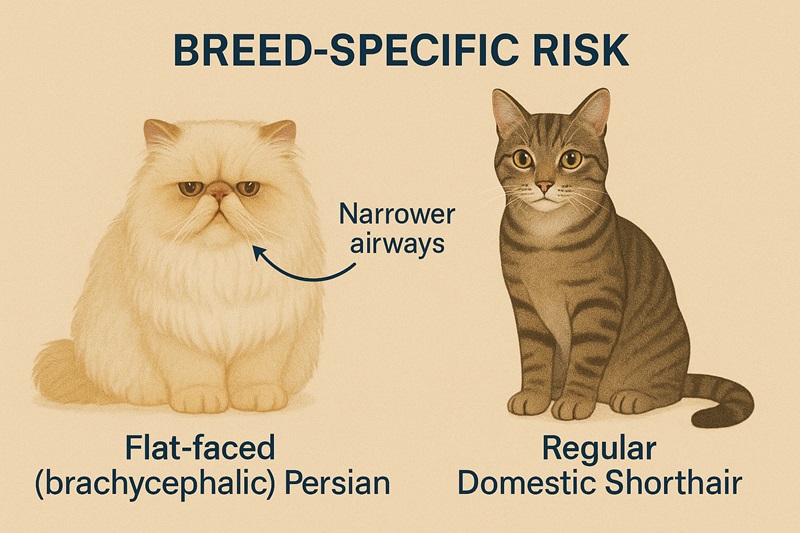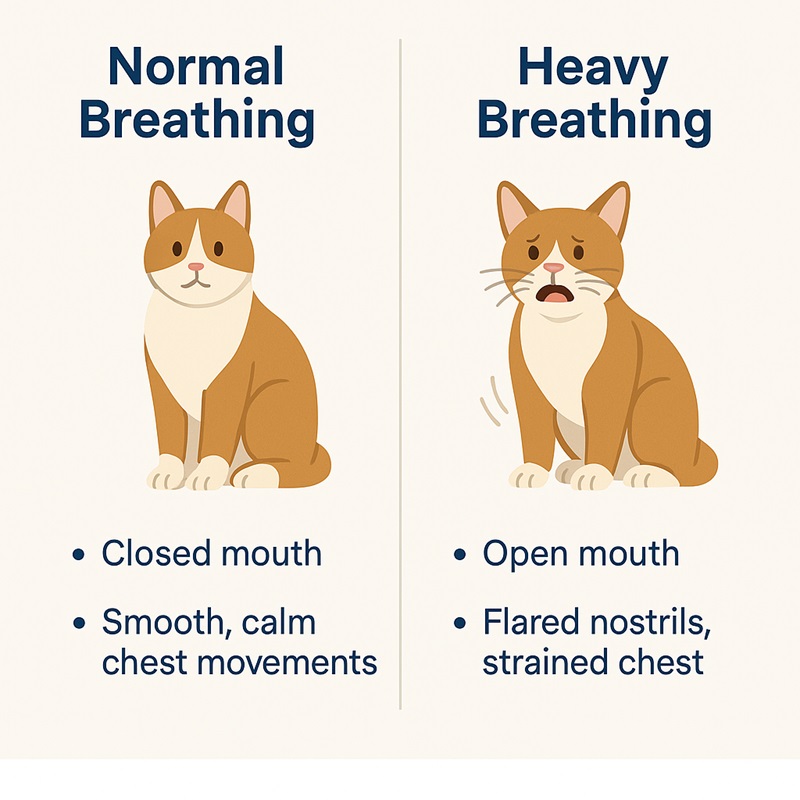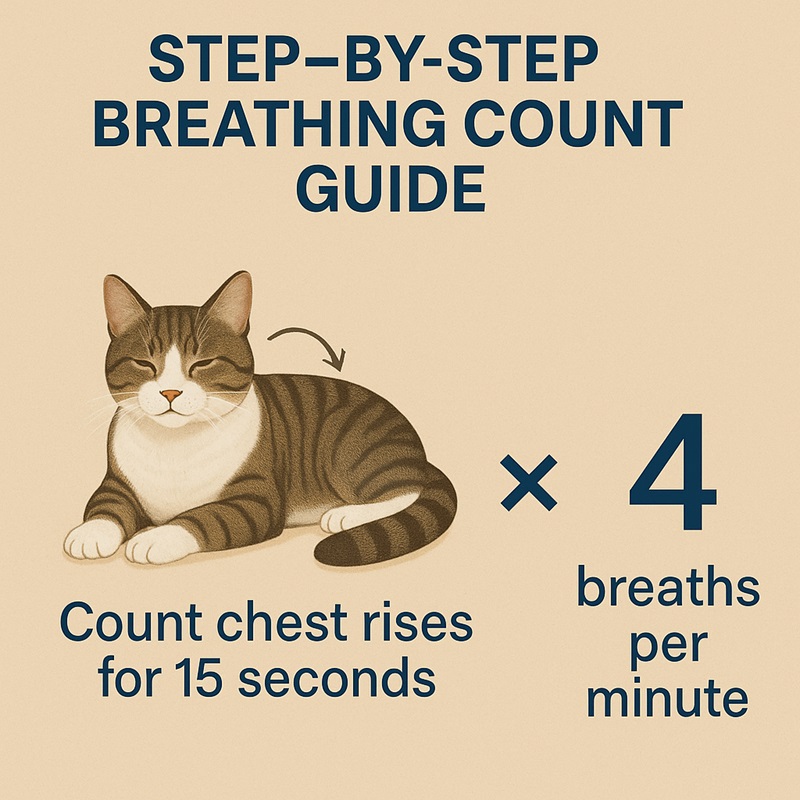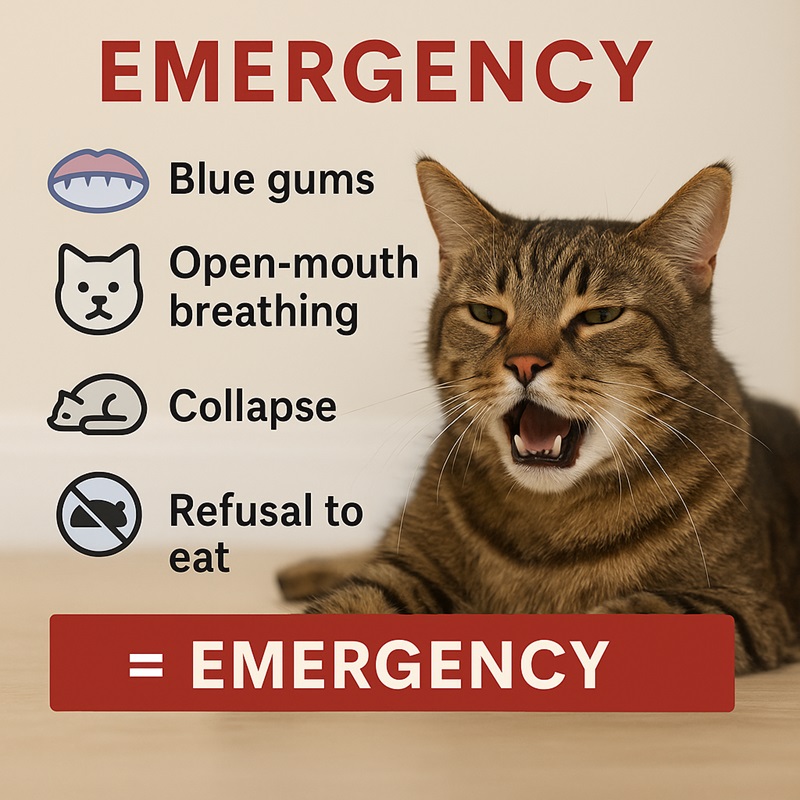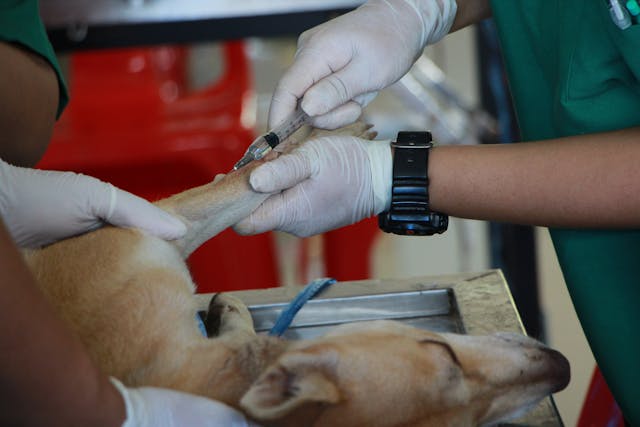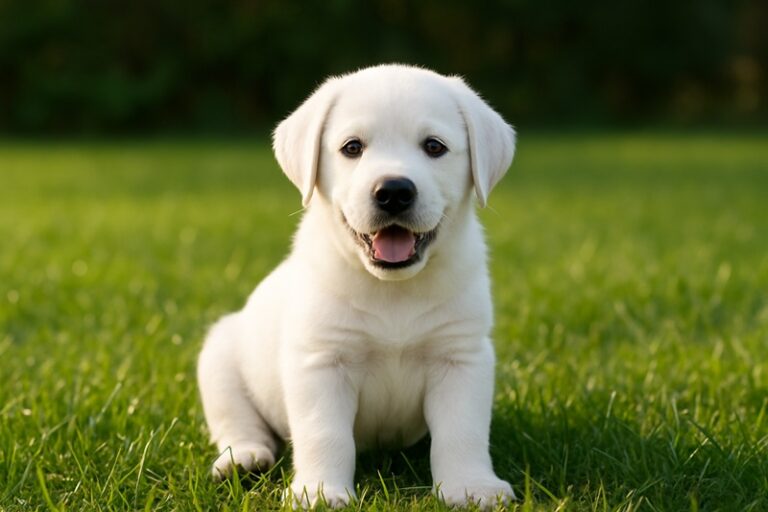Seeing your cat breathing heavy can be worrying. Cats aren’t like dogs—they don’t normally pant or huff. When a cat breathes heavy, it’s not just unusual. It’s a warning. Sometimes it’s stress or heat. Other times, it signals a deeper problem in the heart, lungs, or airways. Knowing the difference isn’t optional. It could save your cat’s life.
What Does “Heavy Breathing” in Cats Mean?
“Heavy breathing” refers to any breathing that looks abnormal for a cat. Vets often use medical terms like:
- Dyspnea: labored or difficult breathing.
- Tachypnea: unusually fast breathing, even at rest.
- Panting: open-mouth breathing, which is uncommon in cats.
A quick distinction: cats may pant briefly after vigorous play or extreme heat, but prolonged or labored breathing almost always signals an underlying health issue.
Common Causes of Heavy Breathing in Cats
Respiratory Infections
Upper respiratory infections, pneumonia, or feline asthma can make breathing hard. Look for sneezing, coughing, nasal discharge, or lethargy alongside the heavy breathing.
Heart Problems
Conditions like hypertrophic cardiomyopathy or congestive heart failure cause fluid build-up in the lungs, restricting oxygen intake. Cats with heart issues may also seem weak, reluctant to move, or collapse suddenly.
Stress or Anxiety
Trips to the vet, loud noises, or new environments can temporarily make your cat breathe heavily. This usually eases once the stressor is removed, but repeated stress-induced heavy breathing should be checked.
Allergies or Asthma
Dust, smoke, pollen, or strong scents can trigger wheezing and rapid breathing in sensitive cats. Feline asthma, in particular, can cause sudden episodes of coughing, crouching, and difficulty exhaling.
Heatstroke or Overheating
Cats don’t regulate body temperature through panting the way dogs do. If your cat is panting heavily on a hot day, it may signal heatstroke—a true emergency that requires immediate cooling and vet attention.
Other Underlying Conditions
Breathing difficulties can also stem from tumors in the chest, internal trauma, anemia, or ingestion of toxins.
Breed-Specific Risks
Not all cats breathe the same. Flat-faced breeds like Persians, Himalayans, and Exotic Shorthairs already have narrow airways. Even a little swelling or stress can make breathing harder for them.
Owners of brachycephalic cats need to be extra alert. Snorting, wheezing, or open-mouth breathing may come sooner and be more dangerous in these breeds. Keeping them cool, calm, and away from smoke or dust can prevent flare-ups.
Heavy Breathing in Older Cats
Senior cats are more prone to health conditions that cause labored breathing.
- Heart disease (such as hypertrophic cardiomyopathy) is especially common in older cats, leading to fluid buildup in the lungs.
- Chronic respiratory conditions, like feline asthma, may worsen with age.
- Cancer or tumors in the chest can obstruct airways or restrict lung capacity.
- Arthritis or pain may indirectly affect breathing if it causes stress or limits posture.
If your older cat is breathing heavy—even if it seems mild—it’s always worth a vet visit. Aging cats can decline quickly, and early detection makes treatment more effective.
Heavy Breathing in Kittens
Kittens are fragile. Their tiny bodies can’t handle stress the way adult cats can. If a kitten is breathing heavy, it’s never “just nothing.”
Respiratory infections spread quickly in young cats. So can parasites like lungworms. Some kittens are even born with heart defects that only show up as rapid, labored breaths.
If your kitten pants, wheezes, or struggles to breathe, treat it as urgent. Young cats decline fast. A vet check is always the safest step.
Cat Breathing Heavy vs. Normal Panting
| Feature | Normal Panting in Cats | Heavy/Abnormal Breathing |
| When It Happens | After intense play, stress, or heat | At rest, during sleep, or without clear cause |
| Duration | Short-lived (1–2 minutes) | Persistent or recurring |
| Appearance | Mild, open-mouth breathing that resolves quickly | Labored, shallow, or rapid breathing; may involve flared nostrils or chest effort |
| Other Symptoms | No other issues; cat recovers normally | Accompanied by coughing, wheezing, blue/pale gums, lethargy |
| Urgency | Usually harmless if brief | Considered a warning sign; may need emergency vet care |
Monitoring Your Cat’s Breathing at Home
Knowing how to check your cat’s breathing can give you peace of mind. It also helps your vet if you can share numbers.
Sit quietly near your cat when they are calm or asleep. Watch their chest rise and fall. Count each rise for 15 seconds. Multiply by four to get breaths per minute. A healthy cat breathes about 20–30 times per minute.
If the number is much higher—or if the breathing looks strained—call your vet. Don’t wait. Cats hide illness well, and early action matters.
Signs That Heavy Breathing Is an Emergency
Cats often mask illness until it’s advanced, so visible breathing problems should never be ignored. Contact your vet right away if your cat shows any of the following:
Open-Mouth Breathing While Resting
Cats rarely breathe through their mouths unless something is very wrong. If your cat is sitting or lying still but still has its mouth open, it may indicate severe respiratory distress, asthma attack, or heart failure. This is an immediate red flag. It’s a major cause of cat breathing heavy.
Blue, Purple, or Pale Gums
Healthy gums should be pink. If they appear bluish, purple, or ghostly pale, it means your cat isn’t getting enough oxygen. This could stem from fluid in the lungs, anemia, or circulatory collapse. It’s a medical emergency requiring urgent oxygen support.
Rapid, Shallow Breaths at Rest
A normal cat breathes about 20–30 times per minute at rest. If your cat’s breathing rate is much higher, shallow, or looks strained—even when calm—it suggests difficulty getting oxygen. Tracking your cat’s resting respiratory rate can help you spot early heart or lung disease.
Extreme Lethargy or Collapse
If your cat seems too weak to stand, moves reluctantly, or collapses, oxygen deprivation may already be critical. Collapse combined with heavy breathing can signal advanced heart disease, severe infection, or trauma. Emergency veterinary care is needed immediately.
Refusal to Eat or Drink
While not as dramatic as collapse, refusing food or water while struggling to breathe is a warning sign. Eating increases oxygen demand, so a cat that won’t eat may already be conserving energy. Prolonged refusal can quickly worsen dehydration and weaken the body further.
Cat Breathing Heavy After Eating or Sleeping
Some cats only show abnormal breathing during specific times, like after meals or naps.
- After Eating: Heavy breathing post-meal could signal digestive discomfort, obesity-related strain, or even heart issues where the added effort of digestion stresses the body. If paired with vomiting, gagging, or refusal to eat, seek veterinary care.
- After Sleeping: If your cat wakes up breathing heavily, it may indicate fluid pooling in the lungs (linked to heart disease) or airway inflammation from asthma. It’s not normal for cats to wake up gasping or panting, and this should be checked promptly.
Monitoring when the heavy breathing occurs (only after food, only when asleep, or throughout the day) gives your vet valuable clues about the root cause.
What to Do If Your Cat Breathing Heavy
When you notice your cat struggling to breathe, it’s natural to panic. But how you respond in those first few moments can make a big difference. Here’s what you can do right away.
Stay Calm
Cats are highly sensitive to human emotions. If you panic, your cat may become even more distressed, making breathing harder. Speak softly. Move slowly. Your calm presence can help ease their stress while you figure out the next steps.
Minimize Handling
Avoid picking up your cat unless absolutely necessary. Movement can worsen labored breathing. Don’t try to force food, water, or medicine. Allow them to sit or lie in the position that feels most comfortable—often crouched with their neck extended.
Create a Calm Environment
Stressful surroundings can trigger or worsen heavy breathing. Move your cat to a quiet room away from loud noises, other pets, and bright lights. Keep the area cool and well-ventilated. A calm, steady environment gives your cat the best chance to stabilize.
Contact Your Vet Immediately
If the breathing doesn’t normalize within a few minutes—or if you see emergency signs like open-mouth breathing or pale gums—call your veterinarian right away. If it’s after hours, go to an emergency clinic. Heavy breathing in cats is rarely something to “wait and see.”
Mistakes to Avoid at Home
When you see your cat gasping, panic can lead to wrong choices. Here’s what not to do.
- Don’t give human medicine. Painkillers like Tylenol or aspirin are toxic to cats.
- Don’t wait days to “see if it gets better.” Breathing trouble rarely improves without help.
- Don’t force your cat to eat, drink, or move. It can worsen their distress when your cat breathing heavy.
The safest response is calm observation, minimal handling, and a call to your vet. Acting quickly avoids mistakes that can make things worse.
Diagnosis at the Vet Clinic
Vets may run tests such as:
- X-rays or ultrasounds to check lungs and heart.
- Blood tests to identify infections or anemia.
- Echocardiogram (heart scan) for suspected heart disease.
- Oxygen monitoring to evaluate severity.
These help pinpoint whether the issue is respiratory, cardiac, or systemic.
Treatment Options and Care
Treatment depends on the underlying cause:
- Respiratory infections → antibiotics, antivirals, supportive fluids.
- Asthma → inhalers, steroids, or bronchodilators.
- Heart disease → diuretics, heart medications, oxygen therapy.
- Heatstroke → rapid cooling, IV fluids, hospitalization.
Long-term management may include regular vet visits, medication, or lifestyle adjustments.
Preventing Breathing Problems in Cats
- Schedule routine veterinary checkups, especially for senior cats.
- Keep the home free of smoke, strong perfumes, and dust.
- Maintain a comfortable indoor temperature.
- Reduce stress with safe hiding spaces and gradual introductions to new situations.
- Monitor at-risk cats (older cats, brachycephalic breeds like Persians).
Final Thoughts
A cat breathing heavy should never be brushed off as “just tired.” Sometimes the cause is minor, like stress or play, but it can also be the first visible sign of a life-threatening condition. If you ever feel uncertain, err on the side of caution and seek veterinary advice. Acting quickly can make all the difference for your cat’s health and comfort.
FAQ (Cat Breathing Heavy)
Is it normal for cats to pant after playing?
Brief panting after intense play can happen, but it should resolve within a minute or two. Anything longer may need vet attention.
What does abnormal heavy breathing in cats sound like?
It may sound raspy, wheezy, or labored, often paired with flared nostrils or open-mouth breathing.
Can stress alone cause heavy breathing?
Yes, but if heavy breathing recurs or happens at rest, consult your vet to rule out underlying conditions.


